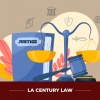
What does objection hearsay mean? You might have heard this phrase in movies or TV shows when a lawyer suddenly stands up and says, “Objection, hearsay!”
But what does it really mean in a courtroom, and why is it important? If you’re curious, you’re not alone.
Many people find legal language confusing, but this article is here to break it down into plain, simple English—no law degree needed.
Hi. In today’s blog, I will explain what an objection is, what hearsay means, and why combining the two matters during a trial.
You’ll also learn when lawyers use it, see an easy example, and find out if there are any exceptions. And that’s not all! I will also try to touch on other types of objections that help keep court cases fair and honest.
So, if this is something that you want to know, keep on reading till the end, and thank me later…
What is an Objection in Court?
In a courtroom, an “objection” is like a timeout in a game. When one lawyer thinks the other lawyer is breaking a rule, they say “Objection!” to let the judge know something’s wrong. The judge then decides if the rule really was broken.
Think of it like this: If you’re playing a board game and someone tries to cheat, you’d probably stop them and say, “Hey, you can’t do that!”
That’s what lawyers do in court when they say “Objection.” It helps make sure everyone follows the rules and that the trial stays fair for both sides.
What Does Objection Hearsay Mean?

Now let’s break down this tricky phrase, shall we?
“Objection hearsay” is a type of objection a lawyer can make during a trial. It happens when one side tries to use something that someone else said outside the courtroom as evidence.
For example, if a witness says, “My friend told me the car was speeding,” that’s hearsay. The friend isn’t there to tell the story themselves, and the other side can’t ask them questions.
That’s why a lawyer might jump up and say, “Objection, hearsay!” because using someone else’s words this way usually isn’t allowed in court.
Why not? Because courts want real, direct evidence. If a person didn’t see something with their own eyes or hear it themselves, their story might not be reliable. That’s why hearsay can be a problem—it’s like telling a secret that might not be true.
When Does a Lawyer Use Objection Hearsay?
A lawyer will use “Objection, hearsay” during a trial when a witness starts repeating what someone else said, and that other person isn’t in the courtroom.
It’s the lawyer’s way of saying, “Hold on! That’s not fair—we can’t check if what they’re saying is true.”
This objection helps make sure the jury only hears trustworthy information. If someone’s not present in court to explain or answer questions, their words can’t be double-checked.
So, lawyers use this objection to protect their clients and make sure the court doesn’t rely on second-hand stories.
Sometimes, lawyers will even object before the full sentence is spoken, especially if they can tell it’s leading to hearsay. Judges usually stop the witness from continuing and decide whether to allow the statement.
Example of Objection Hearsay
Let’s look at a simple example, shall we?
Imagine you’re in school, and the teacher is trying to find out who broke a window.
One student says, “My friend Alex told me that Jamie did it.” The teacher might say, “Wait! I need to hear it from Alex directly, not second-hand.”
That’s exactly how “objection hearsay” works in court.
In a real courtroom, a witness might say, “My neighbor told me she saw the suspect running away.” But the neighbor isn’t in court to tell the story, so the lawyer from the other side can object and say, “Objection, hearsay!”
If the judge agrees, that part of the story won’t be allowed as evidence. It’s like crossing out part of a homework answer because it came from someone else who’s not there to explain.
Are There Exceptions to Objection Hearsay?
Yes! Like many things in law, there are exceptions. Sometimes hearsay is allowed in court—but only in special situations.
Here are a few common exceptions:
- Excited utterance: If someone says something right after something shocking happens, like “He has a gun!” that may be allowed because people don’t usually lie when they’re surprised or scared.
- Dying declaration: If a person says something important when they think they’re about to die, the court may consider it truthful and allow it.
- Business records: Notes or records made in a regular business routine, like a hospital chart, might be allowed even if the person who wrote them isn’t in court.
- Admission by a party: If the person on trial said something earlier that makes them look guilty, their own words can be used—even if they were said outside court.
These exceptions are like special rules. They let hearsay in only when it seems reliable and important enough to help the court find the truth.
What Other Types of Objections are Used in Court?

Besides “objection hearsay,” there are many other kinds of objections lawyers use to protect their clients and keep trials fair. Here are a few common ones:
1. Objection, relevance: This means the lawyer thinks the information being shared has nothing to do with the case. For example, if someone starts talking about what kind of ice cream they like during a robbery case, the lawyer might say, “Objection, relevance!”
2. Objection, leading the witness: This happens when a lawyer is asking a question that already suggests the answer. It’s like asking, “You saw him steal the money, didn’t you?” Instead, lawyers are supposed to ask open questions like, “What did you see?”
3. Objection, speculation: This is used when a witness starts guessing instead of sharing facts. If someone says, “I think he ran because he felt guilty,” that’s just a guess. The lawyer can object and say, “Objection, speculation!”
4. Objection, argumentative: If a lawyer is being too aggressive or trying to argue with the witness instead of asking questions, the other side can object. Courts are about facts, not fights.
5. Objection, asked and answered: If a lawyer keeps asking the same question over and over, the other side can object. It helps stop bullying or badgering the witness.
Each of these objections is a tool. Lawyers use them to make sure things stay on track, the rules are followed, and the judge and jury hear the truth in a clear and fair way.
Read Also:
- Karen Read Case: The Sensational Massachusetts Murder Case That’s Up for a Retrial
- How Do Family Lawyers Handle Objections From The Opposing Party?
- What Happens if Your Personal Injury Case Goes to Trial?











0 Reply
No comments yet.